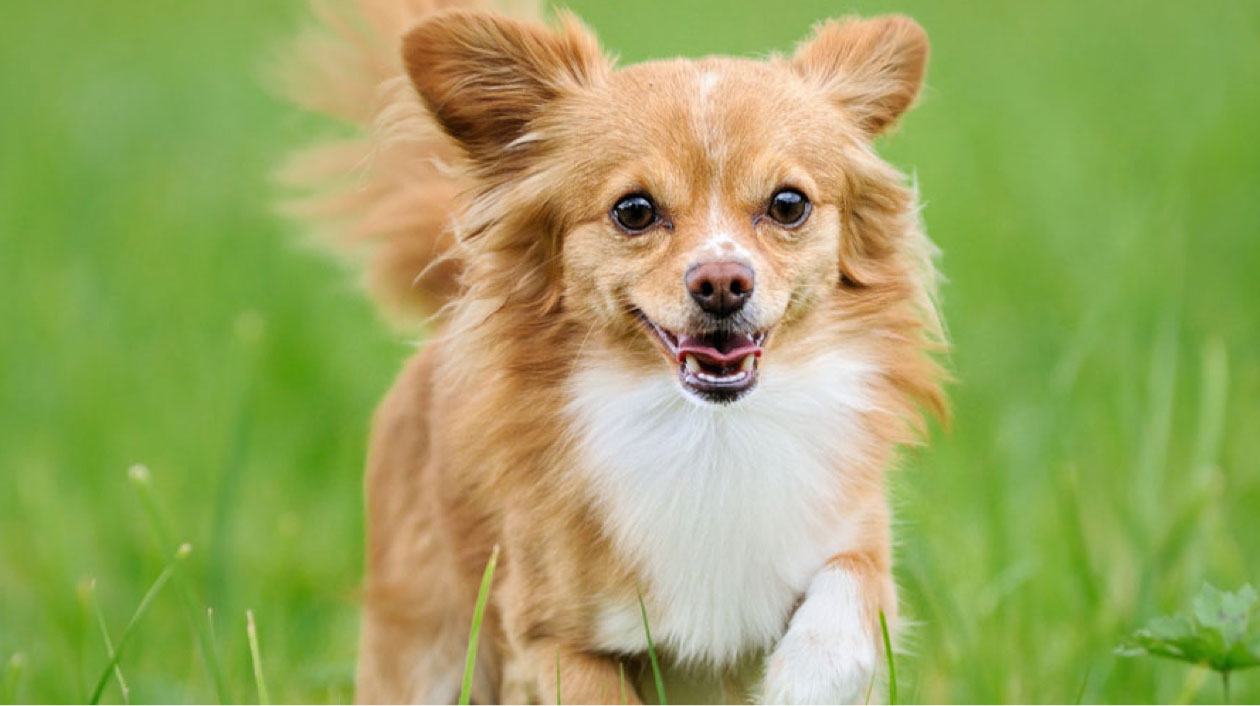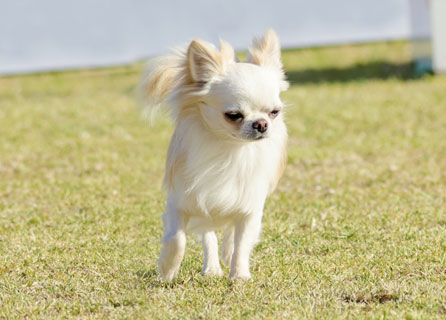
Chihuahua breed guide
Chihuahuas are small, sassy and smart, with a stubborn streak, so you will need to make sure you let this big character know who is boss from the start. Learn more about your feisty companion, from their grooming and exercise needs to the things you can do to keep them happy and healthy.
Breed information and advice
They’re active and easy to train natural lapdogs and good at announcing the arrival of strangers, making them popular with older people. Here's more you should know:
- A Chihuahua puppy can be shy and retiring at first, but will form a strong attachment to you with time.A Chihuahua puppy can be shy and retiring at first, but will form a strong attachment to you with time.
- A good brush once a week will keep their coat in shape.A good brush once a week will keep their coat in shape.
- They'll typically weigh between 1.5kg and 3kg, when fully grown.They'll typically weigh between 1.5kg and 3kg, when fully grown.
- A healthy Chihuahua can live from 12 to 15 years.A healthy Chihuahua can live from 12 to 15 years.
Typical size of a Chihuahua: Small: 15cm-23cm

Recommended exercise and nutrition
Due to their small stature, Chihuahuas need to be gently exercised throughout the day, and should only be walked with a soft, wide collar or harness, to avoid putting too much pressure around their throat. Playing games and using treats and toys is a great way to allow your dog to burn off some energy and build a bond between you both.
Your Chihuahua will not need a huge amount of food - however, it's important to consider their age, size and the time of day when preparing their meals. Always follow the guidance on the food packet.
Half an hour of exercise a day
If walking your Chihuahua, take them to a safe area without any obstacles that they might find difficult to cross, due to their short legs.

Common health problems and illnesses
Your Chihuahua will need all of the usual vaccinations and check-ups to help protect them against common ailments. There are some conditions which this breed is more prone to though, and you may want to familiarise yourself with the symptoms, so you know what to look out for.
A common injury affecting this breed is a dislocated kneecap, also known as a luxating patella. This is a condition that they’ll have been born with, and signs to look out for include occasional skipping or hind-leg lameness. Simple surgery is usually the best way to treat this condition, but your vet can advise on the best course of action.
Chihuahuas are prone to a disorder called hydrocephalus, which is a build-up of fluid on the brain. It’s best to recognise the situation as early as possible. The liquid does two things; it debilitates the bones of the skull and misshapes them. The weight from this extra liquid pushes on the brain itself, bringing on neurological issues. Treatment relies on the seriousness of the condition and the disease progression.
Most cases are diagnosed when a dog is a puppy. The dog will have a large dome-shaped head. If you have any concerns, speak to your vet.
Tracheal collapse is a condition in which the trachea partially collapses or flattens out as your chihuahua is trying to breathe. This leads to irritation and results in gagging, coughing and wheezing symptoms. The trachea airway in your Chihuahua is a very sensitive area. It’s important that your dog get treated if they have this condition because it will get progressively worse without treatment. If you have any concerns, speak to your vet.
Dogs can get many of the same or similar oral diseases as are seen in people. However, whereas the most common dental disease in people is tooth decay or cavities, in dogs it is periodontal disease. Dogs with dental problems commonly show symptoms such as bad breath, excessive drooling, loss of appetite, and more.
As dog parents, we need to take good care of our dog’s teeth by regular brushing. We should also check our dog’s mouth regularly for early signs of dental problems. If you have any concerns, speak to your vet.
Chihuahuas can be born with a heart problem called a congenital heart murmur. Murmurs are caused by abnormal blood flow in the heart. This defect can be detected by a vet listening to a dog’s heart using a stethoscope, and it will often sound like a whooshing noise. Heart murmurs are very common and can simply disappear over time.
Find out about insurance for your Chihuahua
Learn how pet insurance works and what kind of cover you might need for your dog.
Grooming advice
Their short coat means Chihuahuas are relatively low maintenance. Regular brushing will keep their coat soft and tangle-free, and you will only need to bathe your dog once every month or two.
Your companion will either have a smooth or long coat. If smooth, their coat will be more fitted to the body and have a much shinier appearance, whereas if long, their coat could be flat or slightly curly and they'll have a long full tail. If you practice brushing your Chihuahua as a puppy, this will help in the long run and provide valuable bonding time for you.
Regular ear checks are needed to ensure there are no waxy build-ups and to prevent infection. Your pet will need their nails clipped regularly as they will grow quickly - if you can hear their nails tapping on the floor when they walk, they need cutting.
Just as with all other small breeds, your Chihuahua will be prone to poor dental hygiene, but brushing their teeth daily will keep any bacteria and plaque away.
Fun and interesting facts
- This breed is named after the Mexican state of Chihuahua.
- Chihuahuas were regarded as sacred by the ancient Mesoamerican civilisation of Northern America.
- Your dog will enjoy burrowing, so you’ll often find them hiding under piles of clothes.
- They'll also have a surprisingly strong will that will keep you both entertained, as long as you keep charge.
Important information
The content on this page aims to offer an informative introduction to pet breeds, but does not constitute expert veterinary advice. If your dog or cat falls ill or has an injury, contact your vet immediately.
All facts and figures were correct at date of publication and were compiled using a range of sources.
Discover more breeds
Browse our other cat and dog guides to learn about some of the UK’s most popular breeds.